Chronicle of a Deportation
by Badr Bodor for Papierlose Zeitung (Switzerland)
21/24 August 2017 (original posts in German: I. / II.)
I.
It is Friday, August 4, five in the morning, in the detention center of the Zurich airport. After grueling discussions the previous day with the State Secretariat for Migration [Staatsekretariat für Migration, or SEM], I am sleeping soundly in my cell. Suddenly the door opens: four police officers come out of nowhere and announce that they have something to tell me at the police station. It’ll only take five minutes, they say. “You coming?”
Eyes barely open, I look at them blankly and try to understand what is going on.
Three officers grab me by the arms, pull me to my feet and out of the cell, put my hands behind my back, and handcuff me. Panic is shooting through my veins. What could be so important at this early hour, and only take five minutes? It is clear to me that this is not for some quick chat. The airport detention center is deportation detention, after all, where many refugees are waiting for the fateful day to come that they are sent back to their countries of origin.
Isn’t it pretty much impossible to actually be deported?
In the elevator, I gaze in silence at the police squad leader. I know what’s going through his head: he is going to try to deport me to Morocco. We walk to the police car waiting in front of the prison; meanwhile another officer goes back to my cell to get the few possessions I had accumulated in the past four months of being detained. We’ve only been sitting in the car for a few minutes, and I’ve already started to think about what options I have for resistance. There’s not a pilot in the world who would let someone on board without papers, or let someone be brought on by force. That’s what I’ve heard, anyway, especially for Morocco.
We drive to the airport police station. They bring me into another little cell, one that reminds me of the military barracks in Zurich, and command me to wash my face and use the toilet, leaving the door open. In the mirror on the wall of the bathroom, I see my face. I breathe in deeply and say to myself: Be strong!
When I come back out, there is a doctor standing next to the four police officers—someone who is supposed to look after my health and safety during this filthy process. After telling me his name and occupation, he asks me how I feel. I tell him that I am under enormous stress because of what is happening right now.
The police officers stand around us, glaring, for half an hour before the squad leader addresses me: “We received a laissez-passer from your embassy [If a person has no valid travel documents, a destination country has to issue a so-called laissez-passer, otherwise the deportation cannot be carried out. —ed.], and we are going to deport you to Morocco today. We have authorization to use force against you. If you cooperate, there won’t be any problems.”
I haven’t said a single word to him all morning, but now I explode: “What do you want me to say? I don’t want to go back there! Please don’t talk to me, leave me alone!”
Packing up a human being, as if he weren’t one
During the next half hour waiting for the first flight, they strip all the clothes off of my scrawny body and check whether I have hidden any weapons of mass destruction in my behind. After the search, they give me new clothes for the flight, including chic accessories: a leather strap for my hands and two sets of cuffs for my wrists and ankles. When they put those on me, the most awful panic comes over me. Packing up a human being, as if he weren’t one!
For refugees whose asylum applications have been rejected, the SEM typically opts for a “voluntary” deportation first, one without escort. If this does not work, they ratchet up the repression, level by level. In my case, I was pretty sure Morocco would not accept anyone without papers, and before my deportation many pilots had already refused to fly with “involuntary passengers.”

They bring me back to the police car and we drive out onto the tarmac. As we pull up to the airplane, I study the signs posted, looking for anything about Morocco, a symbol, a word, because I assume that the flight will be going there direct. I am surprised when I later learn that it is going to France first. Air France is cooperating in this deal with the police and the state, and taking me from Zurich to Charles de Gaulle! I didn’t quite understand this; thoughts were running circles in my head. They can’t possibly admit me there! But I’ll come back to that.
We sit silently in the car for ten minutes, then I see the flight crew and pilot coming in our direction. The police squad leader gets out of the car and strikes up a conversation with the pilot; they walk together up into the airplane cabin and have a long discussion, I assume about the coming procedure. I am not invited to participate. Then the squad leader reappears and gives his henchmen the command to bring me up. My heart is hammering in my chest. I want to speak to the pilot myself, but once the three police officers have violently wrestled me into the plane, at first I don’t see him anywhere. Then I discover him sitting next to the copilot in the cockpit; they are both acting as if nothing is wrong. So I start to shout. “I don’t want to go back! How can you let this happen on your flight?” He turns his head and glances at me disinterestedly.
Riot on the commuter flight – no solidarity in sight
They bring me to the last rows of seats. To my right and to my left sit police officers; behind me the squad leader and the doctor. I prepare myself internally to raise hell as the other passengers start boarding—it is a normal commercial flight, something I realize only after about twenty minutes. One after another, people take their seats.
In that quiet moment shortly before takeoff, I stand up abruptly and try to get everyone’s attention. I start shouting and cursing, in French, English, and Arabic, in order to inform everyone what is happening right here in front of them. I say that I am a refugee and that I don’t want to be on this plane, that I do not want to be deported to Morocco. Not even twenty seconds in, I feel the police officers’ hands on my body, especially on my neck. They violently force me back down and push my head between my legs. During all of this, not one passenger says a single word. My spine aches under the massive pressure of the the three police officers. And it works: I cannot stand up anymore. When I try once more, I feel a searing pain in my back.
It is only when the pilot makes the first onboard announcement that I realize this flight from Zurich is just the beginning. It’s going to Paris, not Morocco. Ordinarily they show migrants the flight itineraries, all the details about times, destinations, airlines, etcetera, beforehand. They hadn’t shown me anything, not even the laissez-passer. Somehow I feel a sense of relief: I still have a chance.
The plane takes off, and is in the air barely an hour before we descend into Paris. My back is on fire the whole time. When the doctor asks me if everything is alright, I say no, and swear. He asks if I want to take a pain reliever. But I am afraid to take any medication from him, because it could sedate me and endanger my plan for this horrible day. I refuse. I think about Paris. Last year at least forty migrants from Morocco and Algeria were deported from there. I know that I have to do something to stop the next flight. It’s my last chance.
II.
It takes about fifty minutes to fly from Zurich to Paris. Since making a scene on this plane hadn’t accomplished anything, I am thinking about whether to jump from the ramp during boarding when they bring me to the next plane. Because of the scorching pain in my back, it is an effort to hold myself together.
Once the plane lands in Paris and all the other passengers get off, the police take me to a French police car with a Charles de Gaulle airport officer sitting in it. After a short drive, the troop of Swiss police officers takes me out and frogmarches me to the airport police station. It is a long march. We pass by all these passengers; every one of them looks at me as though I were dangerous, with the shackles and all the uniforms around me…though at passport control and going through security, I almost feel like a VIP refugee.
Many doors and gates open and close on the journey to the small police station waiting room. Here I see other Moroccan refugees from other European countries, waiting with anxious faces. With my little bit of English, I can understand the conversation that three Swedish police strike up with the Swiss officers. First they make jokes about how similar the names of their countries are and how people get them mixed up—the dumbest and most absurd thing that one could possible want to hear in such a situation.
Then they talk about the strategy for carrying out their plan: someone needs to talk to the pilot again. An officer from the French corps takes it upon herself to negotiate with the pilot for the Swedish, Norwegian, and Swiss police. They even discuss how it will be easier than usual this time: “If something goes wrong, we’ve got a doctor from Zurich with us! I’ll explain that to the pilot, don’t worry,” I hear the French officer say.
They continue talking for ages, easily a couple hours, and I decide to go to the toilet, just to stand up, and also to see if there’s anything in there that I can use to hurt myself badly enough to go to the hospital. There’s nothing. There are still police standing behind me; they are everywhere, and they ask me if I need something to help me go to the bathroom, because it seems to be taking a while. I refuse, and tell them where they can stick their medications. The doctor explains to me that it’s panic keeping me from going, and he runs the faucet a little so I can relax.
I must resist.
At some point the police officers wrap up their discussions with the question of which hotels they’re staying in in Morocco until they fly back. I think about what will happen if this flight is completed successfully…what does my future look like there? I feel deep sorrow and rage, and the more I think about it, the more I want to resist. I have to do something!
Around noon, the French police show up and tell everyone that we can be brought to the plane. The Swedish officers start taking their victims by the arm and pulling them out of the room, the Swiss officers follow closely behind. I ask for a cigarette, but there is “no time for that.” We walk all the way back, past all the staring passengers again. I start yelling in French: “Don’t worry! We’re just refugees!” The officers bark at me to be quiet.
We walk back to the police car and drive to the plane. This time the Swiss squad leader can stay in his seat; the French police is taking care of negotiating with the crew, and after that the placement of the refugees on the aircraft as well. The discussion on the plane goes on for about fifteen minutes, then the French officers reappear and signal that we should board through the rear door. My gaze is fixed on the ramp, I’m trying to assess where the best spot would be to jump from. The car rolls over in the direction of the plane’s rear door. They begin with the others before they come for me. I am the only refugee in handcuffs. The police open the car door. The French officers are waiting at the top of the ramp with an Air France steward.
“Why is this man wearing handcuffs?”
Slowly I begin climbing the ramp. It is covered with a brown shell like a tunnel, which is why I decide to use the gap between the ramp and the plane door to jump. When we get to this spot, I shove aside the police officer to my right. He moves like a bag of sand, and nearly topples over. But the others were ready, and together they push me back on course; my back is still hurting badly. I start throwing a tantrum, shouting to the steward that I have to speak with the pilot. But nothing happens. They shove me to my seat. The other refugees are looking at me inquisitively: why is this man wearing handcuffs? I greet them in Moroccan dialect and take my place once again between the two Swiss police officers. And wait.
Occasionally I try to address the steward again, and request to speak with the pilot; he ignores me. I look in the faces of the others and see the panic in their eyes. No one had imagined being treated this way, no one had imagined being deported. What will our future be like when we get there? After everything we had endured, until we had finally arrived in Europe!
During the twenty minutes that we sit there in silence, the police eye me warily. The other passengers come on board in a slow drip and stow their baggage. Occasionally they use the toilet in the rear of the airplane, right near me, and I ask each of them if they would call the pilot back for me, because I don’t want to be deported to Morocco. But the police react quickly. They tell me to shut up and threaten to push my head down between my legs again. Meanwhile the squad leader tells the passengers that the pilot already knows about me and they shouldn’t pay me any mind.
Realizing that there is no chance the pilot is coming to speak with me, I start shouting again, with all the energy I have left in me. “Someone please help us! We don’t want to go to Morocco! This—” and the police are on me again, pushing my head down. I am overcome with desperation. Nobody—nobody—even asks what is going on with us. The people just whisper to each other. This is nothing new. I see that most of them don’t know what they can do. Or they think, because of the handcuffs and the police, that I am a dangerous criminal, a terrorist.
Capitulation
I have to remain in this position until the aircraft is aloft; even sitting upright I cannot move or speak; I can only feel this pain; I’m short of air. My body is as if frozen. I say to myself: That’s it. I’m getting deported. What will happen when I land in Casablanca? How will my family, my friends react when they see me again? I give up. I don’t know what else I can do.
Occasionally my gaze alights on the other victims on this flight. They are desperate and terrified.
After a couple hours, the Swiss squad leader pulls out his laptop and starts typing up the report, every detail of this abhorrent procedure. Before we land at Mohamed V airport in Casablanca, he comes over to me and hands me documents upon which are listed all the things they brought along for me. I am to sign them. I refuse, first of all because I don’t know what exactly is written in them, but mostly because it doesn’t matter whether they have my confirmation or not.
A half an hour before landing, he passes me one last paper: a travel ban for the entire Schengen area until 2020. Then he takes my handcuffs off; my entire body suddenly feels different. Then I give the officer nodding off next to me a pat on the face and make a joke for the first time in this nightmare: “Don’t fall asleep! We’re almost there.”
Red earth
In ten more minutes I see the red earth of my country for the first time in four years. This horror which began in deportation detention in Zurich—it is real. I can’t believe it. I keep pinching myself in the hopes I will wake up from this nightmare. The closer the plane gets to the land below, the more I think about what I’m doing here. I still haven’t completely apprehended what is happening to me. I am sad and angry and can’t breathe but I’m still alive and ready to avenge my dignity, the dignity that was shattered by the Swiss police and by Air France and by every participant in this crime.
Finally we land in Casablanca. The other passengers leave the plane. They take me towards the front door. I keep struggling. I tell them over and over that I at least want to go out the rear door, the one I came in through in Paris. Of course they notice that I am trying everything possible to avoid falling into the hands of the Moroccan police. They force me through the front door, and as I finally pass by the pilot, I ask him how he can put up with all this. He just replies that he doesn’t care. I am enraged and spit in his face—it is lucky for him that my mouth is so dry from this torturous day.
The Moroccan police order me to come down. “It’s over. Don’t make it worse.”
They handle readmittance differently now than before, when they didn’t accept passengers without papers. Perhaps they’ve hammered out a new agreement with the EU—this much I understood from the police officers’ conversations—an agreement that compels the Moroccan authorities to admit undocumented refugees back into the country with some kind of laissez-passer. This is not good. Not good at all.
Six hours of interrogation
I am made to wait in an interrogation room at the airport, and over six hours I am pumped for every single detail of my activities and whereabouts in the four years I spent outside of Morocco. Where did I live? What did I do? How was the asylum process in Switzerland? What kind of thing was that to pull, anyway?
This last question especially frightens me. My clothes are soaked with sweat. I can’t say any more about what happened next, but anyone can ask my loyal friends in Zurich and find out.
During these six hours, I keep seeing more and more refugees filter through, other arrivals who had been deported from all over the EU. Twenty total just during my questioning. Later I will see them again outside, with their laissez-passers in hand, which will count as temporary IDs until they get Moroccan papers again. Someone among them tells me he is going back to Tangier immediately to find a boat back to Spain. He can’t go back to his family. His parents died when he was young.
Others just sit there and smoke as much as they can, until the wee hours of the morning, still shocked from what they have endured in the last 24 hours. I am dumbstruck as well, until I finally admit to myself that this nightmare is actually real. With the few coins in my pocket, I call my mother—it’s only enough for ten seconds. I go back to them, back to my parents and my sister, to see them once again so unexpectedly, with nothing in my body except pain and nothing in my soul but sadness.
“I’m sorry, mother. I couldn’t realize my dreams. I couldn’t live out my freedom. I tried everything, but they would not leave me in peace.” We both begin to cry. Later, with my sister’s cellphone, I call my girlfriend in Switzerland and tell her that I’ve been deported. I can’t stop crying, thinking about how this information will make her feel. I search for words to express my feelings, and can’t find any.
The last thing I want to say here is the following: this violence against my freedom of movement will not keep me from trying again. The world is a big place, and I will discover it. When borders and nation-states make it impossible for some people to travel legally…then these people will find other ways to travel, illegally.
NO BORDERS, NO NATIONS – STOP DEPORTATIONS!
This story was transmitted in English to Rosa la Manishe in Switzerland, who translated it into German for Papierlose Zeitung. With their blessings as well as those of Badr, instead of presenting his original English here we have prepared a translation back from Rosa’s German.
Featured image: In front of the airport detention center in which Badr was being held, 17 July 2017. Source: Papierlose Zeitung

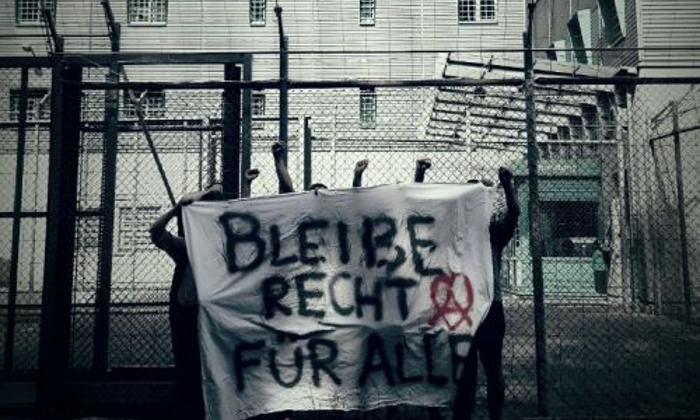
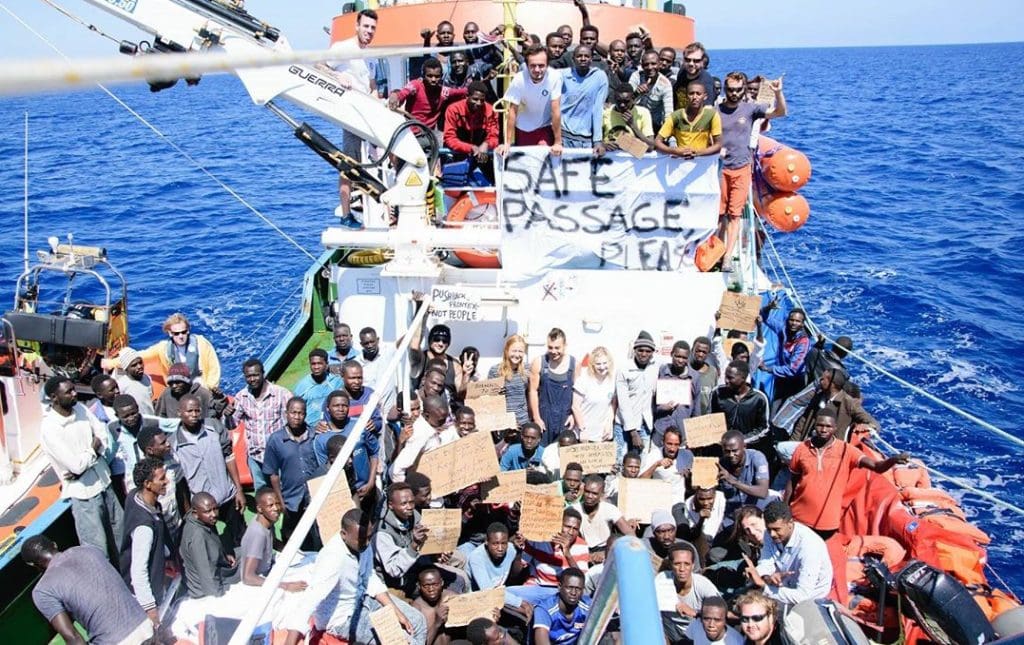
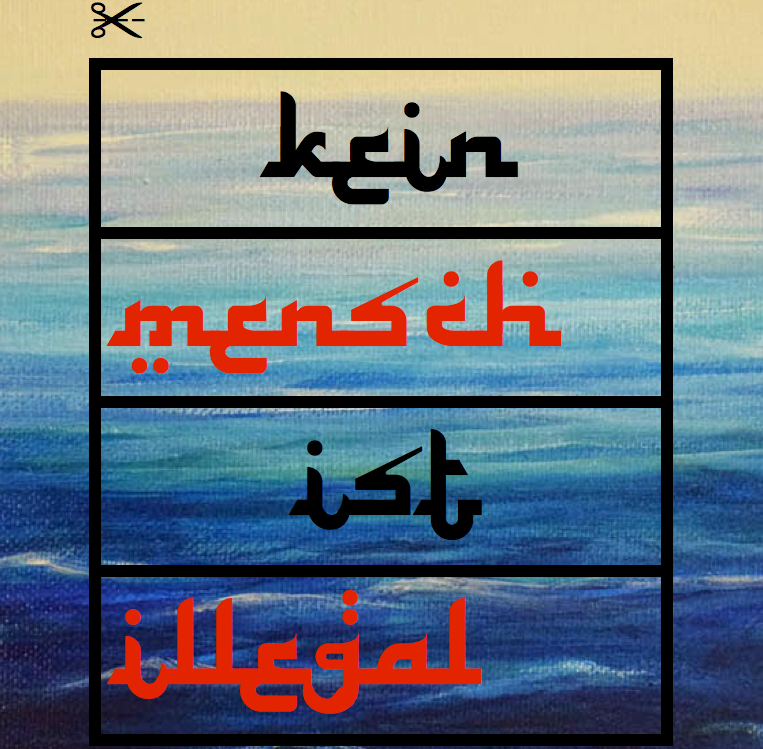
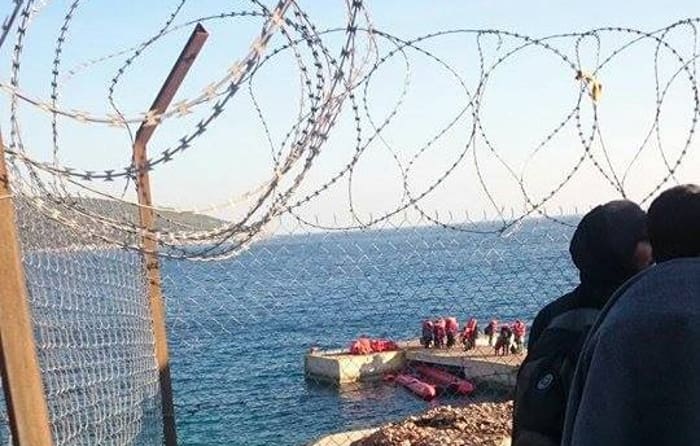
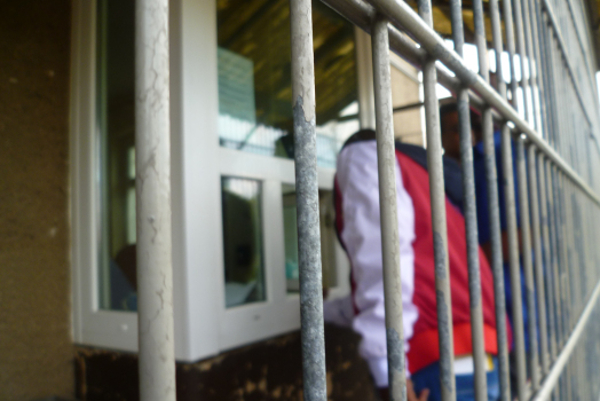
Pingback: Sinking Dreams | aNtiDoTe Zine